 | |
|
An up close and personal interview with U.S. Air Force Veteran and Togetherweserved.com Member:
MSgt John Williams U.S. Air Force (Ret) (1967-1983)
WHAT INFLUENCED YOUR DECISION TO JOIN THE MILITARY?
During my summer vacation following the sixth grade, a carnival arrived on the north side of town just three blocks from our home, on the corner of Michigan Road and Bristol Street, in Elkhart, Indiana. Turning a corner at the carnival, I ran into four military recruiting tents erected beside  one another. I went directly to the United States Marine Corps (USMC) tent and was razzled and dazzled by the recruiter. I left with a bumper sticker and the idea that I also wanted one day to become a Marine "Warrior" too. one another. I went directly to the United States Marine Corps (USMC) tent and was razzled and dazzled by the recruiter. I left with a bumper sticker and the idea that I also wanted one day to become a Marine "Warrior" too.
Immediately after leaving the Marine Corps recruiter, I hurried into the United States Air Force (USAF) tent. When the recruiter told me I could work in any career field I wanted to as long as I got the scores necessary for the job. I was impressed knowing I could work in almost anything in the USAF that I could do in the civilian sector. I left with another blue and white bumper sticker of an Airman, his wife and a boy and a girl all holding hands. Now that is what I wanted.
My plan was simple: I would join the Marine Corps to become a "warrior," then I would join the Air Force for a career. I taped first the Marine sticker on my bedroom wall because that would be the first military service I would join and below it, I taped the Air Force sticker because that would be the service I would join second. Those bumper stickers stayed taped to the wall until I joined the military service many years later.
I was so motivated, I spent the summer reading our entire set of encyclopedias so I could become smarter for the Air Force.
WHAT WAS YOUR SERVICE CAREER PATH?
My plan of Marines first, Air Force second changed when I got tired of school and dropped out. I went to an Air Force recruiter and was informed I could go into its Delayed Enlistment Program  and eventually into electronics. A little later, I checked in with a Marine recruiter and was again razzled and dazzled when he told me not to worry about being in the Air Force Reserves and before I knew what was happening, I had a ticket in my hand to go to Chicago for entry into the Marine Corps. Figuring I could make my life easier in the Marine Corps, I decided never again to speak to anyone about being in the Air Force delayed enlistment program. and eventually into electronics. A little later, I checked in with a Marine recruiter and was again razzled and dazzled when he told me not to worry about being in the Air Force Reserves and before I knew what was happening, I had a ticket in my hand to go to Chicago for entry into the Marine Corps. Figuring I could make my life easier in the Marine Corps, I decided never again to speak to anyone about being in the Air Force delayed enlistment program.
The Marine Corps gave me a guarantee to an aviation career path, and I could get into electronics after completing boot camp, but that changed because of the Cuban missile crisis in 1962. There was a critical need for Structural Mechanic "A" Class personnel, so began my new career path of being a "Tin Bender" with a MOS of 6441. I excelled in this job because I enjoyed creating and fabricating the impossible repairs.
Following my honorable discharge from the Marines, I enlisted into the Air Force (SAC) and became a Structural Repair Technician with the Specialty Code (AFSC) 53470. Five and a half years later, I cross-trained into the Imagery Interpretation Career Field with the AFSC 20670. I became a Photo Interpreter/Analyst and specialized in all source imagery such as satellites, drones and other imagery.
DID YOU PARTICIPATE IN COMBAT OPERATIONS? IF SO, COULD YOU DESCRIBE THOSE WHICH WERE SIGNIFICANT TO YOU?
I was in two war zones: one with the Marines, the other with the Air Force.
During the Dominican Civil War, my Marine unit was sent to Santo Domingo to help restore order in what turned out to be the bloodiest armed conflict in the Dominican Republic in the twentieth century. I arrived there in September 1965 as part of what was called CARIB 4-65 Operation.
While waiting in the chow line, which extended into the hangar deck, I was "volunteered" to be Director of off-loading 5,000 Marines from Camp Garcia on the island of Vieques. My briefer on that job was none other than a CIA Agent. We accomplished this operation in record time with no accidents. For my work, I was awarded the Bronze Star Medal for meritorious service and a spot promotion to Sergeant E-5. negate
While on stage to receive my award around March 1966, I was overwhelmed by the whole event. I felt I was not deserving such an award as I was just accomplishing a job that was asked of me. Then, I made a fatal mistake by saying something like, "I feel like I am not a hero. Hero's are the young men who have died in Vietnam for their country." I was immediately pushed off stage and accused of being an anti-war activist resulting in the award and promotion being cancelled and my military records altered to reflect the event never occurred. That was enough for me to get out of the Marine Corps when my enlistment ended. I then went to step two: join the United States Air Force. Within months after joining the Air Force, I volunteered for Vietnam. I arrived at my new duty station in Da Nang, South Vietnam, on June 10, 1968.
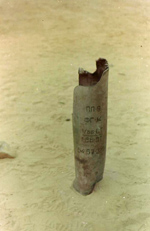 Not counting the sniper bullets whizzing past my ears or the mortars landing where I had just been standing and other close calls, two events really stand out. First was the 122 mm Russian-made rocket landing beside me and instead of exploding with a BOOM and blowing me to bits, it went puff, showering me with dirt. It landed ten feet from me and penetrated only about five feet into the ground. I froze to that spot and couldn't move for many long minutes until people came running over to me asking whether I was alright. More than anything, I was scared of what happened, but I did come close of getting a minor wound: a piece of shrapnel cut across my left shoulder cutting my uniform without piercing my skin. I had someone jump into the hole and dug the casing out so I could look at it. Yep, there was the Russian writing on it, a 122 mm rocket. Not counting the sniper bullets whizzing past my ears or the mortars landing where I had just been standing and other close calls, two events really stand out. First was the 122 mm Russian-made rocket landing beside me and instead of exploding with a BOOM and blowing me to bits, it went puff, showering me with dirt. It landed ten feet from me and penetrated only about five feet into the ground. I froze to that spot and couldn't move for many long minutes until people came running over to me asking whether I was alright. More than anything, I was scared of what happened, but I did come close of getting a minor wound: a piece of shrapnel cut across my left shoulder cutting my uniform without piercing my skin. I had someone jump into the hole and dug the casing out so I could look at it. Yep, there was the Russian writing on it, a 122 mm rocket.
Second was the day I was taking a daily shower. Without even being aware of it, I had fallen into a routine. I had been in Vietnam for about ten months and had become complacent with my surroundings. That particular day when I went into the Quonset hut to take my 'routine' shower, no alarms went off even when I noticed the Vietnamese lady who always washed clothes wasn't there. I was delighted to find there was plenty of warm water when I turned the water on. As I lathered my body with a lot of soap, my world and time as we know it stopped. Bullets began piercing the steel walls all around me. I asked God to watch over me as I began thinking about what should I do now? Do I lean back or hit the floor and pick up bullets that I could have avoided had I just remained still. My mind was racing while I froze in place and then there was a lull. Once again bullets were ripping into the building all around me. I thought the guy must have reloaded his AK-47 with another magazine of bullets. All this time I was waiting for the searing pain of bullets entering my body and blood squirting from many holes.
 By now the warm water had turned cold and I still had soap on the front of me. That's when I noticed the sounds of bullets piercing the building had ceased. I could hardly believe what had just happened. I was still alive. I looked over my body and could not find any bullet holes or blood spilling from my body. How could that be with holes all around me and sunlight filtering in from all those holes? I should have been hit. In fact it was impossible for me not to have been hit by bullets. By now the warm water had turned cold and I still had soap on the front of me. That's when I noticed the sounds of bullets piercing the building had ceased. I could hardly believe what had just happened. I was still alive. I looked over my body and could not find any bullet holes or blood spilling from my body. How could that be with holes all around me and sunlight filtering in from all those holes? I should have been hit. In fact it was impossible for me not to have been hit by bullets.
I immediately fell on my knees and prayed to God and thanking him for sparing my life again. I prayed a lot after that incident. I went back to that shower some days later and was amazed to see the sun shining through all those holes and realized that I really should have been hit with many bullets that day. An angel had been watching over me.
I left Vietnam May 28, 1969.
WHICH, OF THE DUTY STATIONS OR LOCATIONS YOU WERE ASSIGNED OR DEPLOYED TO, DO YOU HAVE THE FONDEST MEMORIES OF AND WHY?
1st Consolidated Aircraft Maintenance Squadron (ADC) from 20 June 1969-Nov 1969 at Selfridge AFB, Michigan. I had made it back to the states from Nam ALIVE! I couldn't believe that because I had thought I would certainly be killed over there.
A couple weeks after arriving on base everyone who was new to the base was volunteered to march through Detroit to show a little strength I suppose. This was right after the Detroit Riots of 1968. No one wanted to volunteer so we were selected. I didn't survive Vietnam only to be shot in Detroit. I briefed the reluctant platoon and marched them in the parade. Even though we encountered activists spitting on us and brandishing clubs, bricks and other weapons along the way, we remained unharmed. I thanked everyone and told them to immediately get their uniforms cleaned.
 It was on this assignment I had the thrill of a lifetime. I helped rebuild a J1 Jenny Air Force trainer aircraft. We had to fabricate some parts and I helped to spread dope over the canvas skin of the aircraft. I remember spreading a couple coats of dope to make the canvas taunt and waterproof. When we finished rebuilding this aircraft our commander invited Eddie Richenbacker, the American fighter ace in World War I and Medal of Honor recipient, to sit in the cockpit. The 84-year-old really enjoyed sitting there and telling stories about his 26 aerial victories. It was on this assignment I had the thrill of a lifetime. I helped rebuild a J1 Jenny Air Force trainer aircraft. We had to fabricate some parts and I helped to spread dope over the canvas skin of the aircraft. I remember spreading a couple coats of dope to make the canvas taunt and waterproof. When we finished rebuilding this aircraft our commander invited Eddie Richenbacker, the American fighter ace in World War I and Medal of Honor recipient, to sit in the cockpit. The 84-year-old really enjoyed sitting there and telling stories about his 26 aerial victories.
To make sure it was airworthy, our CO, Col. Popovich test flew the refurbished aircraft before it was shipped to Wright Patterson AFB, Ohio for the Air Force Museum.
When the base closed down some months later, I was transferred to the 94th Fighter Interceptor Squadron (FIS) at Wurtsmith AFB, Michigan up on the shores of Lake Huron. The 94th FIS was the same squadron that Eddie Richenbacker flew in during World War I. I was elated to be in the same squadron that Major Richenbacker had been in.
FROM YOUR ENTIRE SERVICE CAREER WHAT PARTICULAR MEMORY STANDS OUT?
When our aircraft flew in from Vietnam and landed in Alaska, we were not greeted with a hero's welcome. Instead, we were herded to one end of the terminal and placed behind a yellow caution taped off area near the windows. We had to wait the 3 1/2 hours it took to ready our aircraft to take off again for California. We even had armed guards walking the perimeter of the taped off area to make sure we didn't venture out of our designated area of the terminal.
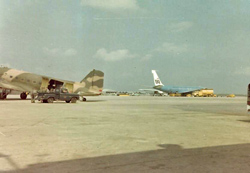 I was furious at the way we were treated, like criminals, so I walked up to one of the guards and asked if I could cross the yellow tape and use the head across the hall. His answer was no. I was furious at the way we were treated, like criminals, so I walked up to one of the guards and asked if I could cross the yellow tape and use the head across the hall. His answer was no.
So I unzipped my trousers and pulled my p---. His eyes got big and he said, "What are you doing?"
I calmly replied, "I'm going to pee on your boots if you don't let me go to the restroom now!"
He reluctantly allowed me to pass under the tape and I stayed in the head a long time. He never came to make me leave. I eventually left and remained in our small quarantine area in Alaska. That was not how I had planned to visit Alaska. I was disappointed with our government and the people of the USA for being mislead so easily. While we didn't know it yet, this was a prelude to what was in store for all of us when we landed in California.
As the aircraft approached California, we were advised to change into civilian clothes immediately upon landing because the people there didn't like or care for military personnel in uniform. We were safer not wearing our uniforms. I refused to change because I was proud of my Air Force uniform and my country, the USA!
I was spit on a lot and called baby killer. Many other horrible things were thrown or said to me by these cowards. I just smiled at them thinking that is why I am in the military serving and defending these misguided Americans so they can have the right to do these disgusting things to me personally. I had honor, integrity and believed in America and what she stands for in the world. A beacon of hope for others who wants to become Americans too.
WERE ANY OF THE MEDALS OR AWARDS YOU RECEIVED FOR VALOR? IF YES, COULD YOU DESCRIBE HOW THIS WAS EARNED?
Instead of medals for valor, I got much more from my tour of duty in Vietnam: pride in my accomplishments and service to my country.
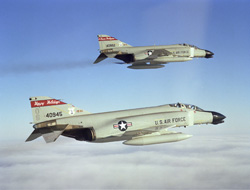 I rebuilt a F-4D fighter jet (Tail Number 463) that had lost its belly, one engine and still managed to land at Da Nang. The pilot should have been given a medal however our commander was in Saigon at MACV Headquarters explaining why he had already sustained 2 Aircraft crashes when this one occurred. I was ordered to rebuild this aircraft to flying status so the CO wouldn't lose his job (3 losses and your are replaced). Took me three months. I rebuilt a F-4D fighter jet (Tail Number 463) that had lost its belly, one engine and still managed to land at Da Nang. The pilot should have been given a medal however our commander was in Saigon at MACV Headquarters explaining why he had already sustained 2 Aircraft crashes when this one occurred. I was ordered to rebuild this aircraft to flying status so the CO wouldn't lose his job (3 losses and your are replaced). Took me three months.
I also modified the existing blueprints and fabricated nine Maintenance Control Center consoles. The Commendation letter stated: "Although hampered by lack of proper equipment and materials, Sgt. Williams volunteered his experience, talents and many overtime hours toward this project. Through his efforts the new Maintenance Control Complex enjoys one of the most modern job control centers in Southeast Asia."
OF THE MEDALS, AWARDS AND QUALIFICATION BADGES OR DEVICES YOU RECEIVED, WHAT IS THE MOST MEANINGFUL TO YOU AND WHY?
The Good Conduct Medals. Being a Christian in the military and loving and forgiving those who are trying to destroy your career and character assassination rather than being your mentor is rather difficult at best. However, with God's help I persevered.
This was brought home to me in April 1975 while 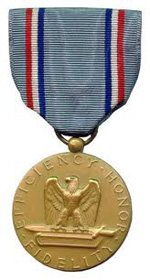 I was with the 548 Reconnaissance Technical Group (RTG), in Hawaii. One morning I woke up to find 9 lymph nodes had swollen to the size of nickels overnight. I prayed to God and asked for guidance. A half hour later over a cup of coffee a flash of insight hit me with the thought that time was of the utmost importance to me and I must get those lymph nodes out of my body today, that time was my enemy. I was with the 548 Reconnaissance Technical Group (RTG), in Hawaii. One morning I woke up to find 9 lymph nodes had swollen to the size of nickels overnight. I prayed to God and asked for guidance. A half hour later over a cup of coffee a flash of insight hit me with the thought that time was of the utmost importance to me and I must get those lymph nodes out of my body today, that time was my enemy.
After a lengthy discussion with the base surgeon, the Colonel removed them and told me he would report the operation to my commander. Two weeks later, my CO said he had no idea why I was asking him about my possible cancer. I went to the base clinic to see the surgeon who was no longer there. He had been reassigned back to the states and no one would give me contact information. I asked to see my medical records, only to find out they had "accidentally" been shredded. That meant no chemo or radiation treatments.
I was somewhat certain I would die, leaving behind a young wife and two small children. It was then that I placed my LIFE IN GOD'S HANDS. I was now powerless to control my life or career. But nothing happened. Thirteen years later, a fellow work associate from Hawaii who had now been promoted to Chief Master Sergeant asked me a very strange question: "We are puzzled to find out you had cancer in 1975 yet you never received treatment. How is it you are still alive?" Without hesitation, I answered, "I guess God wasn't ready for me yet. I must still have more work to do."
All the time I continued to work hard and speak kindly to these people. I learned in the Marine Corps if you know who your enemies are then you can work around them. That advice helped me retire as a Master Sergeant with an honorable discharge.
And that's why earning Good Conduct Medals means more to me than anything else.
WHICH INDIVIDUAL PERSON FROM YOUR SERVICE STANDS OUT AS THE ONE WHO HAD THE BIGGEST IMPACT ON YOU AND WHY?
Marine Drill Instructors (DIs) Sgt. Ford, Staff Sgt. McCarthy and Sgt. Solomon. They realized I needed additional training when I had beaten everyone at pugil stick fighting, aced all the tests I was given and could run faster than anyone else. They decided I needed to learn that I  was part of something greater than myself. I also think they didn't like the idea that I arrived at boot camp with a guarantee of an assignment to aviation. I guess they wanted us all to be "generalists." There was one other thing that go it their way. I could not be the number one Marine when they had already selected the man they wanted to mold to become the number one Marine in their platoon. was part of something greater than myself. I also think they didn't like the idea that I arrived at boot camp with a guarantee of an assignment to aviation. I guess they wanted us all to be "generalists." There was one other thing that go it their way. I could not be the number one Marine when they had already selected the man they wanted to mold to become the number one Marine in their platoon.
One day after I aced another test, I was pulled from the classroom and ordered by Sgt. Ford to place my hands in my pockets. When I complied with his request, he accused me of disobeying a DI's orders of never placing our hand in our pockets. He ordered me to report to his office that evening before taps for disobeying orders.
That night when I reported and knocked on the DI's door, I was invited inside. The door was closed behind me and all three DIs began beating on me. I instinctively fought back trying to defend myself. That infuriated them even more, causing them to really brutalize me. After what seemed like an eternity and after my elbow and head went through the walls, I noticed the office was in shambles. Somehow after my beating I left their office walking on my own two feet, albeit slightly bent over. At least I was not like another recruit who had been carried out and sent to the hospital.
Because I don't bruise and have a high pain tolerance, I acted like nothing had happened. I told the recruit they had selected to be number one he had better do the best he had ever done because I was going to whip his ass if he didn't. From that day on, I missed the first five questions on every test. I guess the DIs had made their point: I must do what is best for the group not for personal excellence. On the graduation day, Sgt. Ford said I wasn't military material and shouldn't even consider making the military a career.
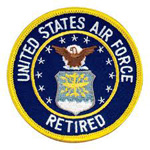 Sgt. Ford may have convinced me I shouldn't make a career in the Marine, but he and no one else was going to decide whether I could make the military a career. In spite of Sgt. Ford's inappropriate pronouncement, I succeeded for four and a half years in the Corps and went on and spent 16 1/2 years in the Air Force, retiring a Master Sergeant. I wonder what Sgt. Ford, where ever he is, would think about me now? I need to thank him for giving me a challenge that resulted in me making the military a career. Sgt. Ford may have convinced me I shouldn't make a career in the Marine, but he and no one else was going to decide whether I could make the military a career. In spite of Sgt. Ford's inappropriate pronouncement, I succeeded for four and a half years in the Corps and went on and spent 16 1/2 years in the Air Force, retiring a Master Sergeant. I wonder what Sgt. Ford, where ever he is, would think about me now? I need to thank him for giving me a challenge that resulted in me making the military a career.
CAN YOU RECOUNT A PARTICULAR INCIDENT FROM YOUR SERVICE THAT WAS FUNNY AT THE TIME AND STILL MAKES YOU LAUGH?
I had just gotten a nickel cup of hot steaming coffee and was walking through the old French hangar at Da Nang when we came under a heavy rocket attack. While everyone was flopping around on the floor of our structural repair shop, I just stood there holding my cup of coffee. Then I calmly stepped over the people and sat down against a load bearing wall beside our 12 foot brake made of 1/2 inch steel. I felt safe sitting there drinking my coffee. If a rocket hit the ceiling of the hangar and the roof collapsed, I would have a 98% chance of surviving. The rest of the personnel didn't but they obviously didn't know that. I enjoyed that cup of coffee.
One month later a Jewish airman asked me why had I not attended the Jewish Synagogue? I asked him why had he asked me that question and he answered, "Everyone thinks you are  Jewish because you refused to throw that nickel cup of coffee away during that 36 rocket attack. So if you are Jewish why aren't you attending the Synagogue?" Jewish because you refused to throw that nickel cup of coffee away during that 36 rocket attack. So if you are Jewish why aren't you attending the Synagogue?"
I informed him I was not Jewish but the people could think whatever they wanted. He must have liked what he heard and invited me to the Synagogue any time I wanted to come. I wanted to go with him one day but I just ran out of time.
I still chuckle at that incident and am amazed at how people in general can judge and label other people by taking a situation out of context rather than just talking to them.
WHAT PROFESSION DID YOU FOLLOW AFTER THE SERVICE AND WHAT ARE YOU DOING NOW? IF CURRENTLY SERVING, WHAT IS YOUR CURRENT JOB?
In my tenth week of my Imagery Interpreter Specialist and Radar Prediction (SAC) Course at Lowry AFB, Colorado, I realized I may not pass the stereoscopic training. I was blind in my left eye and shouldn't even have been at this school or career field in the first place. I brought the matter up to my CO but he surprised me when he said he already knew about my blindness but if I could pass this stereoscopic block of training, he and DIA (Defense Intelligence Agency) had a place for me at SAC Headquarters at Offutt AFB, Nebraska where stereoscopic vision wasn't needed as bad because they had many jobs I could perform.
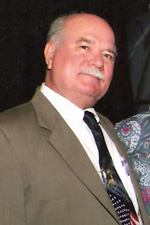 The 544 ARTW, 548 RTG, 544 IES considered me a liability but DIA considered me an asset to the Air Force. I excelled at every job assigned to me and was a pioneer in opening up the career field to one eye Imagery Interpreters (IIs) especially in the civilian sector. The 544 ARTW, 548 RTG, 544 IES considered me a liability but DIA considered me an asset to the Air Force. I excelled at every job assigned to me and was a pioneer in opening up the career field to one eye Imagery Interpreters (IIs) especially in the civilian sector.
DIA wanted me to come to the east coast but I wanted to stay in Nebraska, which essentially ostracized me from the intelligence career field and especially from the Photo Interpreter profession. Yet after graduating from Bellevue University, a DIA colonel had instructed me take a job on the east coast. I worked it out to stay in Nebraska where I contracted myself out to the nuclear industry four years. Then I contracted myself out for small package pickup and delivery for another four years.
I worked 10 years as a helper for a Web Press Operator and operated the web press when he was absent. The day after I turned 60 years old they laid me off.
I have volunteered for the Church of Christ for over twenty years, of which ten years was spend working on the bulletin. I have been preaching (evangelism) for a number of years also with no pay. God intervened and saved my life many times so I am giving back by preaching God's word and helping others. One of my great pleasures is giving blood and platelets for nearly 40 years. I figure if God has given me a platelet count of 350,000, I can give three units every two weeks in the hope of helping someone other than myself. So far I have given over 105 units of whole blood and around 249 units of platelets, however due to new guidelines this year I am now unable to give anything because I had cancer twice now (I had Malignant Melanoma skin cancer 2 years ago).
WHAT MILITARY ASSOCIATIONS ARE YOU A MEMBER OF, IF ANY? WHAT SPECIFIC BENEFITS DO YOU DERIVE FROM YOUR MEMBERSHIPS?
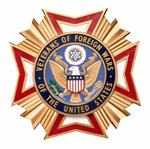 I am a lifetime member of the Veterans of Foreign Wars (VFW) Post 2543 in Plattsmouth, Nebraska. I am a lifetime member of the Veterans of Foreign Wars (VFW) Post 2543 in Plattsmouth, Nebraska.
The benefits I derive from this organization are meeting veterans who too have survived foreign conflicts. They understand little things that may not mean a thing in the civilian world. We understand one another.
The greatest benefit I get back is volunteering for the Honor Guard for our fallen comrades. For many years I have volunteered for the funeral detail and really feel humbled with this experience. It is the least I can do for these great men and women of our wonderful country who went to war to uphold our culture and ideals that have made this the greatest country on earth!
HOW HAS MILITARY SERVICE INFLUENCED THE WAY YOU HAVE APPROACHED YOUR LIFE AND CAREER?
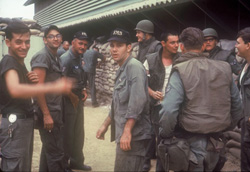 Serving in the military and traveling all over the world seeing how few have the freedom we enjoy, I cannot help but feel good about us as a nation and a people. Yet by seeing the way the rest of the world struggles, I am reminded on how many of us take our freedom and way of life for granted. We must be proud of the ideal and culture that have made us so great. We should be equally prideful that we are the only nation in the world that has rebuilt the very countries that have tried to destroy the very fabric of our being. Serving in the military and traveling all over the world seeing how few have the freedom we enjoy, I cannot help but feel good about us as a nation and a people. Yet by seeing the way the rest of the world struggles, I am reminded on how many of us take our freedom and way of life for granted. We must be proud of the ideal and culture that have made us so great. We should be equally prideful that we are the only nation in the world that has rebuilt the very countries that have tried to destroy the very fabric of our being.
The Marine Corps taught me to take charge in any given situation and make sound and good decisions and to stick with them. They also taught me honor, duty and integrity and if I give my word, be true to it.
I learned there is more to life then the pursuit of money.
There are many opportunities to volunteer to help others.
WHAT ADVICE WOULD YOU HAVE FOR THOSE THAT ARE STILL SERVING?
While in combat if you have a gut instinct, or a bad feeling, or a premonition, immediately act on it because your life or those around you could depend on what you do. God could have been talking to you or giving you advice and you must not ignore Him or His Angels.
Get all the education you can in your career field or college. You can become and accomplish anything you dream about through an education.
Always think positive.
Remember a handicap persons is only handicap because he thinks he is!
IN WHAT WAYS HAS TOGETHERWESERVED.COM HELPED YOU MAINTAIN A BOND WITH YOUR SERVICE AND THOSE YOU SERVED WITH?
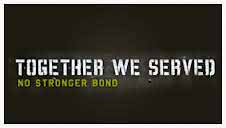 I have found an old friend and co-worker. I believe it is still an avenue where military personnel can realize they are not alone with their feelings. Others have shared those same feelings too. Even though we have a bond civilians cannot understand I personally believe this Togetherweserved.com can also help those wives, daughters and sons with insight about what their love ones experienced too. They can relive those experiences and better understand them. Understanding we are all Brothers and sisters without regard to race is very important. I have found an old friend and co-worker. I believe it is still an avenue where military personnel can realize they are not alone with their feelings. Others have shared those same feelings too. Even though we have a bond civilians cannot understand I personally believe this Togetherweserved.com can also help those wives, daughters and sons with insight about what their love ones experienced too. They can relive those experiences and better understand them. Understanding we are all Brothers and sisters without regard to race is very important.
In combat, we depend on each other and help one another. We need to strive to do the same in our civilian world. We are all in this life together and bleed the same red blood.
|
|
|
Share this Voices Edition on:


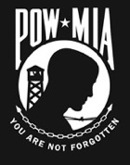
 |
|
TWS VOICES
TWS Voices are the personal stories of men and women who served in the US Military and convey how serving their Country has made a positive impact on their lives. If you would like to participate in a future edition of Voices, or know someone who might be interested, please contact TWS Voices HERE.
This edition of Air Force Voices was supported by:

AirForce.Togetherweserved.com
For current and former serving Members of the United States Air Force, Army Air Corps, Air Force Reserve and Air National Guard TogetherWeServed is a unique, feature-rich resource helping Airmen reconnect with lost Wingmen, share memories and tell their Air Force story.
To join AirForce.Togetherweserved.com, please click HERE.
|
|